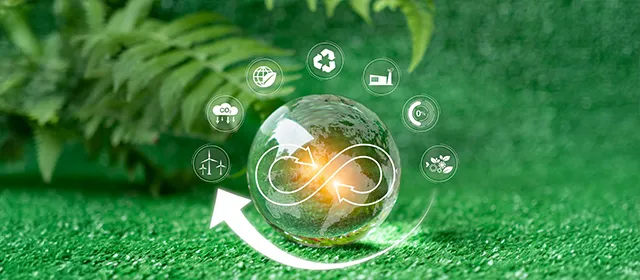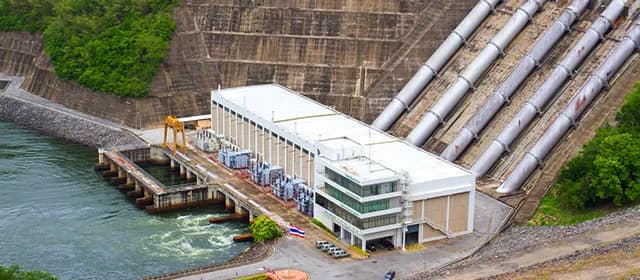Global waste is growing fast: the world generated about 2.24 billion tonnes of solid waste in 2020. If current trends continue, annual waste could rise to about 3.88 billion tonnes by 2050, making prevention and circular systems urgent. (Source: www.worldbank.org)
At the same time, material reuse remains low in many regions. Europe’s overall circularity rate is roughly 12 percent today, with recycled materials making up only about 11.8 percent of total material use in 2023.
These gaps create a clear opportunity: companies that design products for reuse, scale take-back and recycling systems, and shift to secondary materials can sharply reduce waste streams and resource demand.
Overview of the Circular Economy Market
The circular economy market is rapidly expanding. According to Kings Research, the global circular economy market is likely to generate a revenue of $2,882.11 billion by 2031. In a circular economy, products and materials are kept in use for as long as possible, minimizing waste and reducing the extraction of finite resources. This transition is driven by several key factors.
Environmental concerns play a major role, as companies face increasing pressure to reduce their carbon footprint and environmental impact. Resource scarcity is another critical factor, as industries face rising costs and challenges related to the depletion of natural resources. Furthermore, government regulations and policies promoting sustainability, such as extended producer responsibility (EPR) and bans on single-use plastics, are pushing companies to adopt circular practices. Consumer demand for eco-friendly products is also influencing the market, with more people seeking sustainable alternatives.
Additionally, technological advancements, such as improved recycling technologies and digital platforms for resource sharing, are making circular models more feasible. These factors collectively drive growth in the circular economy market, offering economic, environmental, and societal benefits while contributing to long-term sustainability.
Top 10 Circular Economy Companies in 2026
The circular economy market is growing rapidly, and several global corporations are making significant strides toward sustainability by adopting circular principles. Here’s a look at ten leading companies:
1. Adidas AG
Adidas is focusing on circularity by transitioning towards sustainable practices like product rentals, repairs, and resale. Their initiatives include the "Circular Fashion Fast Forward" project and using recycled materials to extend the lifecycle of sports products. Adidas aims to close the loop in the textile industry through partnerships and innovations in material reuse.
In March 2025, Adidas, Levi’s, Under Armour, and other major fashion brands joined the Behind the Break initiative, launched by Fashion for Good and The Microfibre Consortium, to tackle microfiber pollution at its source by researching fibre fragmentation during textile production.
2. mInter IKEA Systems B.V.
IKEA's circular strategy includes using recycled materials in products and services like furniture leasing and second-hand stores. Their 2030 goal is to become fully circular, focusing on sustainable sourcing and product design that extends lifecycles, alongside a global commitment to phase out non-recyclable plastics.
In September 2025, IKEA U.S. reaffirmed its commitment to climate action by hosting a fireside chat and panel titled “Thinking Outside the Box: How Well-Designed EPR Powers a Circular Future,” emphasising the role of extended producer responsibility (EPR) in designing circular business models.
3. PepsiCo, Inc.
PepsiCo is advancing circularity by focusing on sustainable packaging. Their "pep+" initiative targets using 100% reusable, recyclable, or compostable packaging by 2030. Recently, PepsiCo expanded its investment in recycling infrastructure and waste reduction as part of its goal to drive sustainability across the supply chain.
In January 2025, Dow, SAP, and PepsiCo reflected on the outcomes of INC-5, the fifth UN negotiating session on the Global Plastics Treaty, calling for stronger, legally binding rules to curb plastic pollution.
4. Procter & Gamble (P&G)
P&G’s commitment to circularity includes reducing plastic waste through partnerships like the HolyGrail project, which uses digital watermarks to improve packaging recycling rates. They also promote refillable and reusable packaging models for their home and beauty products.
In June 2025, P&G partnered with Durham and Newcastle Universities to scale a circular chemical-production approach, converting captured industrial CO₂ into feedstock for materials like detergents, plastics, and apparel. The collaboration developed a framework combining lifecycle analysis, techno-economic evaluation, and regulation to guide low-carbon manufacturing decisions.
5. The Coca‑Cola Company
Coca-Cola's "World Without Waste" program focuses on recovering every bottle or can they sell by 2030. The company is also working on innovative solutions like plant-based and recyclable packaging to reduce waste in the beverage industry.
In May 2025, Coca-Cola and its bottling partner Swire Coca-Cola initiated Hong Kong’s first plastic bottle recycling drive via New Life Plastics Ltd, enabling locally collected bottles to be recycled into new ones. The campaign also promotes lightweight, label-free bottles and collaborates with community groups to bolster the circular economy.
6. Unilever
Unilever’s circular economy focus is on reducing plastic use through their "Less Plastic, Better Plastic" program. They aim for all plastic packaging to be reusable, recyclable, or compostable by 2025. Unilever is also investing in refillable packaging systems and alternative materials.
In August 2025, Unilever and the Business Coalition for a Global Plastics Treaty reaffirmed their call for harmonised global regulations addressing the full lifecycle of plastics. The coalition, representing more than 300 businesses, noted that the latest session of the Intergovernmental Negotiating Committee (INC5.2) in Geneva failed to reach an agreement, and urged governments to adopt consistent rules on phase-outs, product design, and extended producer responsibility to scale investment and tackle plastic pollution.
7. ADM
Archer Daniels Midland (ADM) focuses on the agricultural supply chain circularity by reducing waste and finding new uses for by-products. ADM is enhancing sustainability through innovations in food processing that aim to reduce emissions and promote renewable energy.
8. BASF SE
BASF SE, a global chemical company, is at the forefront of industrial sustainability, leading efforts to develop circular solutions for plastics, packaging, and chemicals.
BASF is leveraging its “ChemCycling” initiative to produce new materials from recycled plastic waste. They are investing heavily in advanced recycling technologies and have committed to increasing the use of sustainable raw materials in production processes.
9. H&M Group
H&M’s circular initiatives include their clothing take-back program and investing in textile recycling technology. They aim to make their entire product line circular by 2040, which involves using sustainable materials and promoting the reuse and recycling of garments.
10. HP Development Company, L.P.
HP Development Company, L.P. leads in electronics recycling, with programs that allow consumers to return used hardware for refurbishment or recycling.
HP is committed to sustainability by designing products with recycled materials, such as their ink cartridges made from ocean-bound plastics. They are also pioneering circular business models like device as a service (DaaS) to extend the lifecycle of IT products.
These companies are integrating circular economy principles into their operations to reduce environmental impact and create more sustainable business models.
Trends Reshaping Circular Economy Market Landscape
Several trends are reshaping the circular economy market landscape, reflecting the evolving nature of sustainability and the growing recognition of its importance across industries:
- Product as a Service (PaaS) Model: More companies are adopting the PaaS model, where products are leased or rented rather than sold. This trend enables manufacturers to retain ownership of products and materials, encouraging better maintenance, reuse, and recycling. Examples include subscription services for fashion, electronics, and appliances.
- Recycling and Upcycling Innovations: Advanced recycling technologies, such as chemical recycling and bioplastics, are emerging to handle complex materials that previously ended up in landfills. Upcycling, turning waste into higher-value products, is also gaining momentum, especially in industries like fashion and construction.
- Extended Producer Responsibility (EPR) and Policy Support: Governments worldwide are increasingly implementing regulations to make companies responsible for the entire lifecycle of their products. EPR laws encourage businesses to design products that are easier to recycle or reuse, driving circular innovation.
- Circular Fashion: The fashion industry is undergoing a significant transformation toward sustainability, driven by consumer demand and environmental concerns. Brands are increasingly focusing on slow fashion, designing durable garments, and establishing recycling and resale platforms to extend the lifecycle of clothing.
- Corporate Commitments and ESG Integration: Many companies are integrating circular economy practices into their Environmental, Social, and Governance (ESG) strategies, recognizing that circularity aligns with long-term business resilience and sustainability. Investors are also increasingly favoring businesses with strong circular economy commitments.
- Zero-Waste Initiatives: Both companies and cities are committing to zero-waste goals, seeking to eliminate waste generation through better resource management, improved recycling systems, and product redesign. These efforts are reshaping industries ranging from manufacturing to retail.
Wrapping it Up
Moving toward a zero-waste future will depend on coordinated action across value chains. Key players are expanding circular business models (for example, product-as-a-service, refurbishing, and resource recovery), investing in design for reuse, and supporting extended-producer-responsibility and take-back schemes to close material loops.
Governments and international bodies are also deploying policy tools and measurement frameworks to scale these approaches. Together, these steps can reduce waste growth, cut raw-material demand, and make long-term production and consumption far more sustainable.



